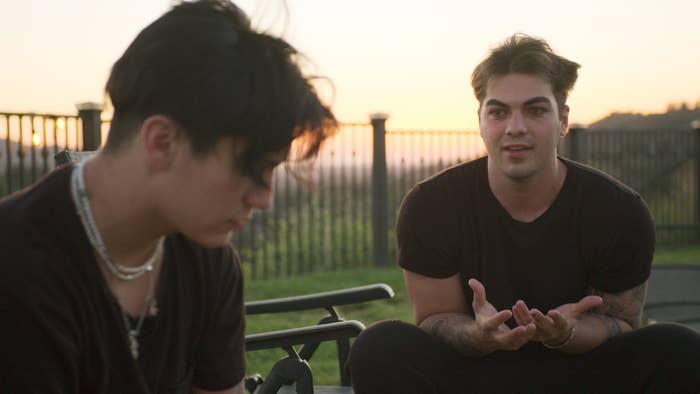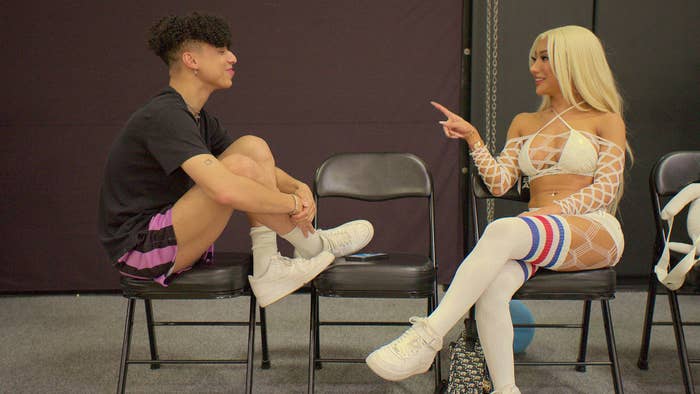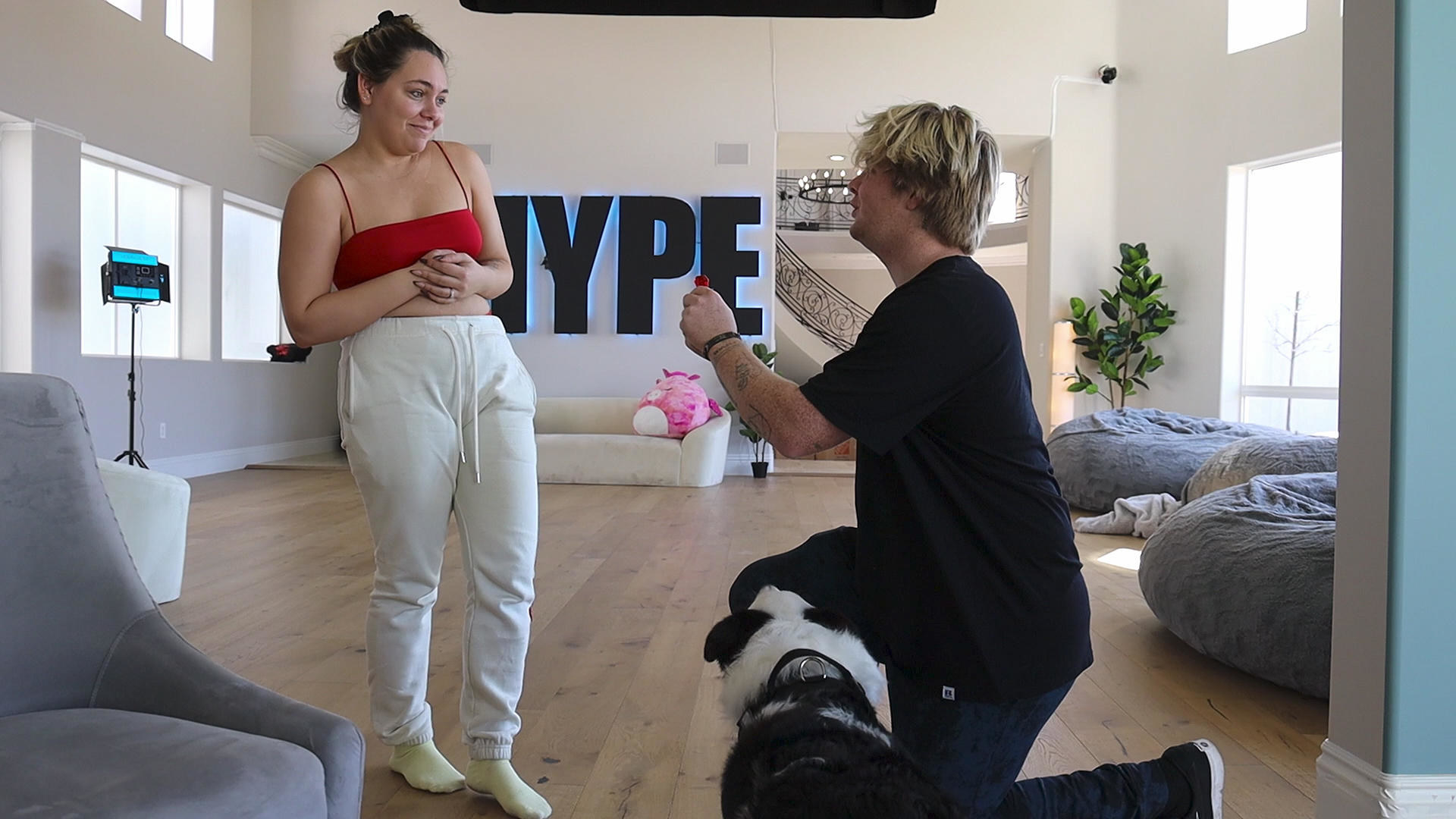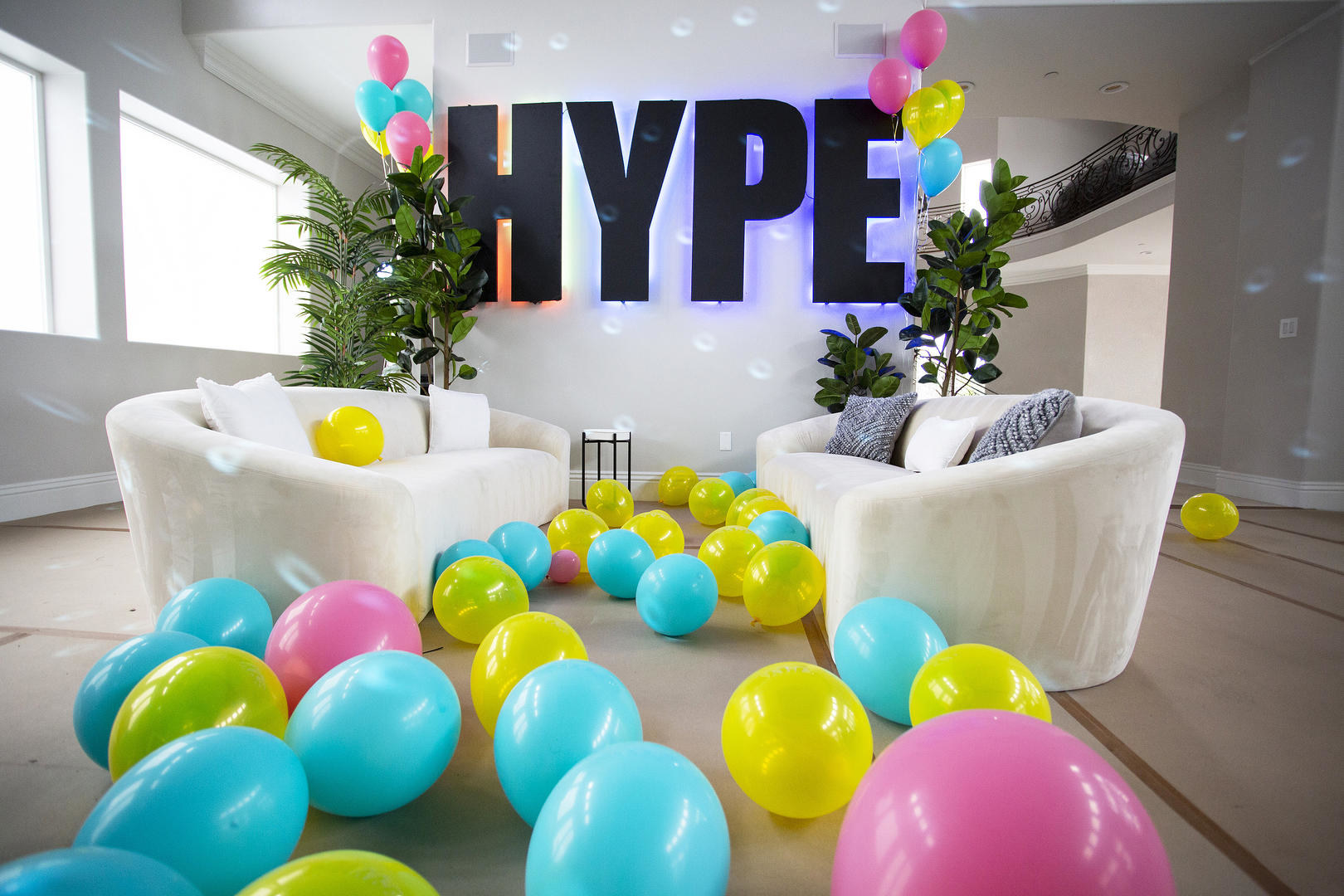
In a scene from Netflix’s new reality show Hype House, 22-year-old Thomas Petrou, the de facto leader of the eponymous TikTok content collaborative, calls a meeting to discuss the members’ lack of hustle.
When they gather — there are maybe 10 or so members — he looks around the room and wonders how the group got so small.
“Everyone else got too famous,” one says with a laugh.
This line encapsulates the central tension of Hype House, which manages to somehow make being young, rich, and famous in Los Angeles seem horribly depressing. The members of the Hype House, who are all in their late teens and early 20s, live together in a mansion and create content for TikTok as a collective under the assumption that bringing more creators together will make their videos more dynamic and interesting.
No one in the house, though, seems to be enjoying themselves. Throughout the show’s eight episodes, the members of the house are palpably distressed, consumed with the need to succeed while watching their peers soar to heights they know they might not achieve.
Even Chase “Lil Huddy” Hudson, a founding member who has become a breakout star, is stressed. Credited with helping to start an emo revival among Gen Z, Hudson was signed by Interscope Records, and here he seems to realize he needs to leave his old friends behind to advance his music career. Hudson approaches this dilemma with the awkwardness of a first-year college student trying to dump his high school girlfriend during Thanksgiving break. It’s clear he wants to move on — he has moved out of the Hype House into his own mansion — but he’s very aware that his clout was a major factor in the group’s success. Without him, what do they have?
“Chase is the person who made the Hype House what it was. Because he's not here, everything in this brand falls on me,” Petrou remarks in one scene, noting in another that Hudson could lift any member to new heights by just posting them on his page every once in a while, but doesn’t.
The Hype House was started in late 2019 by Hudson and Petrou and at one point counted bonafide TikTok sensations like the D'Amelio sisters (Charli appears briefly in the series, but isn’t interviewed) and Addison Rae among its ranks. Today, though, many of the stars have moved on, leaving Petrou to lead a stable of less experienced and less famous creators. “Less famous” is all relative; everyone in the house has millions of followers on TikTok, but the remaining team does not enjoy the same recognition as its superstar alumni.
“We were like a family… it was so much fun just creating content every day, and now times have changed,” Petrou laments, interspersed with nostalgic clips of old Hype House videos.
This is a problem for Petrou, who is trying to keep the Hype House afloat financially. He’s having trouble motivating his posse of mostly indistinguishable white dudebros to contribute to the house’s bottom line (one scene cuts from Petrou lecturing the group about their laziness to a shot of one member throwing a potted plant at another’s sleeping form).
While Petrou frets to the camera about working 10- to 12-hour days to fulfill the group’s brand partnership deals, which pay for everything in the house, members like Connor Yates, 23, and Michael Sanzone, 19, lounge around acting like, well, young people who have no adult supervision and very little responsibility. “I’m so bored!” Yates complains.
Ironically, the interesting thing about the majority of the Hype House members, considering their popularity, is how boring they are to watch. The majority are so unmemorable that I couldn’t name most of them, and very few outside of Hudson and Petrou have a storyline over the course of eight episodes. They all blend together, a mass of white, good-looking young people lounging around the house, eating snacks in sweatpants, and occasionally doing pranks or generic dances on TikTok.
Larray, a YouTuber and semi-involved Hype House member, explains in one scene why he no longer goes to the house as much. “The vibes don’t hit,” he says.
Larray and fellow YouTube star Nikita Dragun (who is friends with many of the members) are by far the most watchable cast members, which is odd because Dragun’s not actually in the Hype House and neither of them found fame primarily on TikTok. They’re so peripheral to the collective that you have to wonder if production brought them in to make up for the dull Hype House crew (they are also, notably, the only POC on the show).
The YouTubers could certainly carry a show by themselves. Dragun is compelling (that’s how she became so famous!), but it often feels like she’s on a totally different show. She discusses the ins and outs of running her makeup line, which she developed after failing to find products she wanted as a trans woman, and drives around Los Angeles in her fuschia sports car complaining about Trisha Paytas attacking her on Twitter. I could have watched hours more of just that. But this is Hype House — she eventually has to drag herself back there to do things with the crew. She gets the boys into makeup and heels, and though it’s not as entertaining as watching her cut loose, it’s a reprieve from the monotony of the uninspired TikTokers.

Larray, who is known for his YouTube comedy, is also a standout, discussing his rise to social media fame and how it has impacted his life. Larray is extremely dynamic on camera, with a unique presence. In one poignant scene, he discusses how he became estranged from his parents when he came out as gay. His own crew seems more tightly bonded than the Hype House’s, from his loving grandmother and aunt in Compton to his roommate Ravon, who used to be a fan and got Larray’s attention by posting a Carpool Karaoke–style video featuring a cutout of the YouTuber in the passenger seat.
Meanwhile, the members of the house who do have storylines mostly made me sad. Vinnie Hacker, a creator who looks like he stepped out of an Abercrombie catalog, openly struggles. As Dragun describes it, Hacker is “extremely sexualized” on TikTok because of his hot bod, but he’s really just a gamer at heart who wants to go on Twitch rather than post thirst traps.
The other two members who get substantial screentime are young couple Alex Warren and Kouvr Annon, both 20 and original Hype House members. Both Warren and Annon open up to the cameras about their tumultuous childhoods and the instability they experienced before finding each other and the Hype House. This history contextualizes Warren’s thrumming anxiety, which radiates off him every time he’s onscreen. He’s constantly talking about making sure he gets more views, how popular he is, and how to remain popular.
This leads him to plan more and more ambitious prank videos, with middling results. In one attempt, Warren hurts his ankle and spends many subsequent scenes hobbling around. In another, sadder scene, he convinces Annon to hold a fake wedding for a video, which he is convinced will get a good amount of views. Annon is quietly crushed; she says she would marry Warren for real, but he makes it clear he’s only interested in a stunt wedding. Annon tells the cameras she's ready to have a family with Warren, even though she’s only 20. Aware of the mismatch, the rest of the house awkwardly proceeds with the fake nuptials.

“I think it's a little cruel to be to honest, but at the same time, like I guess anything for views,” Dragun quips. (Warren later admits the video didn’t perform the way he had hoped.)
All of this highlights the central issue, which is that the Hype House is a shell of its former self. There’s a lot of pressure to perform well, and the TikTokers’ mental health seems to be affected by these expectations. Even Petrou’s Hail Mary attempt to reclaim the former magic — a big group trip to Joshua Tree, where they can all create together in a new setting — ends in disappointment. After a night of fighting and bad vibes, Petrou slumps to the ground outside. He recites the names of Hype House girls who have made it big: Charli, Dixie, Addison.
“I wish that they ever talked to me,” he says.
“I’m just so scared of having to go back to where I came from,” Petrou says (he also opens up in the show about having a difficult upbringing). Annon later tells Petrou the same fear drives Warren, who admits on camera to being “very depressed.”
The drama unfolding in Hype House reminds me of the TikTok sound slash Taylor Swift lyric: “I think I’ve seen this film before, and I didn’t like the ending.” Content houses like the Hype House have been popular since YouTube celebrities became a thing, and they aren’t a guaranteed path to fame and fortune. Perhaps the most well known, Jake Paul’s Team 10, was also once the darling of the social media scene and it launched several stars; Petrou himself was even briefly a member.
However, in the years since, the Team 10 house has been accused of being host to bullying and sexual assault, and Paul was accused of exploiting the members and taking their profits. The house was raided by the FBI in 2020 after Paul was investigated over the looting of an Arizona mall.
But perhaps most relevant to the members of Hype House is that many Team 10 members have vanished into obscurity. Many still work in the industry, like Nick Crompton, who was able to parlay his Team 10 experience into becoming vice president of commercial innovation and artist strategy at Universal Music Group, and Alissa Violet, who works as an Instagram influencer. But their clout is mostly gone, and they have been supplanted by newer, shinier objects — mainly, well, the kids of the Hype House.
At the end of the show, Petrou seems to be wrapping his mind around the fact that the Hype House may not be long for this world. “It just doesn’t work anymore; I think it’s just time to shut [the Hype House] down,” he says.

In the final episode, Petrou reveals many of the key members, including Annon and Warren, have moved out, although they are still in the collective. It still exists, but the dysfunction makes you think: Is the Hype House still here because of the Netflix show, and not the other way around?
If I was conspiratorially minded, I would say it’s like the show was made with the explicit purpose of convincing teenagers it sucks to be social media famous. “I feel like a kid who has all the toys in the world, but no batteries to operate them,” says Petrou in the last episode, head in his hands. Every single Hype House member seems miserable, and you just want to give them a hug, a nice place to sleep, and a 24-hour social media break.
Hype House is certainly an interesting insight into the machinations of content houses and the struggles that come with them, but it is not a very fun or interesting show. By the end, I was begging the Hype House to break up and end our misery — as well as theirs. ●
